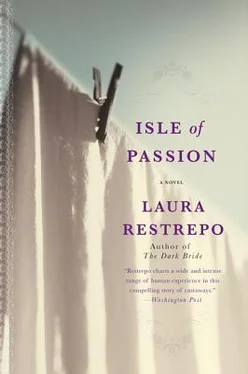“Ramón, I say there is no ship.”
“You don’t see it, Secundino, but it’s there, all lit and silvery, waiting for us.”
“It’s not a ship, Ramón, it’s a manta ray, the one that killed us.”
“It was not a manta ray, Secundino. It was sharks.”
During the day Alicia understood and accepted Ramón’s death. But come night she allowed herself to be confused by these apparitions, and she would often sit looking at the sea in the moonlight and awaiting his return. Not even Tirsa, the strong one, who did not know about poetry or believe in the afterlife, was able to escape this collective delusion where the living and the dead coexisted.
“Secundino came last night to console me,” she told Alicia once.
“And what did he say?”
“Evil does not last forever, and neither do we.”
“He’s right.”
The souls of Pedrito Carvajal, Arnulfo Pérez, Faustino Almazán, and the other soldiers would come in at midnight through the holes in the roof, and, after extending a gray serape on the floor, they played cards, drank pulque, and filled the house with their loud shouts.
“You can kiss your money good-bye, I have the king and the jack.”
“Then you can shove them you know where, because here comes the ace.”
Besides those who had died, there were the private ghosts. These had come from everybody’s hometown or were inherited from loved ones. The women started talking about them in order to pass the time, to recall their lost childhood fears. But the darkness of night in Clipperton was so desolate that it naturally evoked all sorts of phantoms. Alicia summoned the dead dwarfs that people called chaneques; an image of Our Lady of Sorrows pierced by seven daggers; and the legendary Ensign Nun, whom Death did not carry away in a horse carriage, like in Orizaba, but in the ship of the Flying Dutchman. Tirsa dragged in all the specters Cardona had left with her, brought to Clipperton from the land of the Chamula Indians. The one that terrified them most was Yalambequet, a flying skeleton that made his way into people’s homes to steal their souls, announcing his presence by a thunderous clattering of bones that pierced the air.
“There goes Yalambequet. May God have mercy on us,” the women and the children soon learned to say when there was a storm, and even when there wasn’t one, just in case Yalambequet came unannounced.
They saw La Llorona, beautiful and phosphorescent, her arms full of lilies and her naked body wrapped in a rebozo , always wandering, always howling about the loss of her children and sweeping her long hair against people. They saw Doña Carlota, Ramón’s mother, who appeared in a white nightgown and with her bonnet of black feathers, complaining about how undernourished and uncared for the children were. They frequently saw a silent, nice lady dressed in brown, whom nobody had met before. Clipperton itself had its own ghosts, like Ferdinand Magellan, the mariner who gave it its name, Isle of Passion, because of all the pain and sickness his crew had suffered when sailing close to it. Or like the pirate John Clipperton, who retired to his favorite refuge in order to relive orgies of old, keeping the women awake with the noise of wineglasses shattering on the floor, harlots’ laughter, and swords clashing.
The ocean was dotted with ghost ships. The Flying Dutchman’s was joined by a black schooner with her sails forming a cross, and another one that was just drifting, enveloped in flames. It was common belief that Arnaud and Cardona had been deceived by the Marie Celeste , the infernal ship that attracted death and ill fate the way a magnet attracts iron.
Supernatural incidents were on the increase in quantity and quality; they ceased being individual events and turned into collective experiences. Night after night when the temperature lowered, a throng of ghosts formed at the southern rock to begin the pilgrimage around the isle, carrying lighted torches, praying, dragging their chains, and leaving behind letters and messages for the living. They were the souls of all those who had died in connection with Clipperton, from those who had been condemned and marooned by the pirates to the Dutch sailor who drowned on his way to Acapulco. At first, the women ran home, bolted their doors, and covered their heads with their arms, in order not to see the river of lights or hear the thump-thump of their footsteps. But later they dared kneel on their balconies, waiting for the procession to pass by. The next morning they went out early to pick up the messages from the other world, and if these contained any orders or wishes, they would fulfill them faithfully. It did not take very long for the living to join the nightly wanderings of the spirits. Against Alicia and Tirsa’s wishes, Francisca, Benita, Rosalía, and sometimes Altagracia marched all night behind the dead, and the next morning, bedraggled, they also looked like ghosts and had no energy to deal with their daily chores.
The spirits became capricious and demanding. Their orders took up all the time of those still living. They asked for stone altars, ceremonies, offers of food, and even goods impossible to obtain on the isle, like cigarettes and bunches of the fire-red cempaxuchitl flowers, which feed the insatiable hunger that tortures the dead in their tombs. The isle looked like a primitive holy land. Everywhere there were stone altars surrounded by plates of food, yellowed photos of the deceased, and a few remaining personal possessions: a straw hat, a sandal, a razor, a handkerchief, an image of the Virgin.
One night Tirsa and Alicia stayed home with all the children while the other women marched in the procession. Tirsa told Alicia that she had discovered Benita and Francisca flagellating themselves and wearing hair shirts and tight pieces of old rope around their thighs.
“Things cannot go on like this,” warned Alicia, “or we are going to end up burying each other alive.”
Alicia and Tirsa agreed to take drastic measures for all, beginning with themselves. The only way to survive was to stop this delirium. They bid farewell forever to the souls of Ramón and Secundino, explained the dangers of the situation, and wrote five commandments. They swore to enforce them until common sense prevailed and things returned to normal, for which they might have to impose penalties on those who would not comply. With a knife, they carved these commandments in big letters on the wall, and when the others returned at dawn, they were surprised by the following pentalogue:
First: From now on it is absolutely prohibited to pray, to build altars, and to perform religious sacrifices.
Second: Only what we see and the people we can touch are real. All others are hereby banished from Clipperton forever. It is forbidden to deal with the dead.
Third: No one is allowed to go out of the house at night, unless it is for a short task and after obtaining permission. The hours of the night are for resting, and for protecting the children and keeping them company.
Fourth: Nobody can scare a child, or say to a child things that are not true.
Fifth: She who violates any of these laws, in word or deed, will be thrown out of her house, separated from her children, and condemned to live in isolation.
Alicia and Tirsa went all around the isle toppling altars and burning idols and fetishes. Alicia’s moral authority and her imposing personality, Tirsa’s courage and physical strength, plus the unwavering alliance between the two, ensured their leaving behind these ominous times in which the dead invaded Clipperton and made slaves out of the living.
In spite of heading the struggle against the threat of the incorporeal, Alicia began to have strange experiences, to feel inexplicable presences. She felt she was weakening, and that something inside her was depriving her of energy, something that hoarded the food she ate, that sucked the liquid with which she calmed her thirst. Someone who took away the air she breathed and robbed her heart of blood. She seemed to have a strength inside of her, smaller but more powerful, which existed and thrived at the expense of her own stamina, as her body, already ravished by malnutrition and fatigue, became weaker.
Читать дальше












